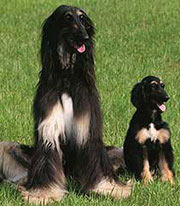| 世界上第一只克隆狗在韩国亮相(图) |
| http://www.sina.com.cn 2005/08/10 11:29 国际在线 |
 South Korean Scientists Clone First Dog South Korea's pioneering stem cell scientist has cloned a dog, smashing another biological barrier and reigniting a fierce ethical debate - while producing a perky, lovable puppy. The researchers, led by Hwang Woo-suk, insist they cloned an Afghan hound, a resplendent supermodel in a world of mutts, only to help investigate human disease, including the possibility of cloning stem cells for treatment purposes. But others immediately renewed calls for a global ban on human reproductive cloning before the technology moves any farther. "Successful cloning of an increasing number of species confirms the general impression that it would be possible to clone any mammalian species, including humans," said Ian Wilmut, a reproductive biologist at the University of Edinburgh who produced the first cloned mammal, Dolly the sheep, from an adult cell nearly a decade ago. Researchers have since cloned cats, goats, cows, mice, pigs, rabbits, horses, deer, mules and gaur, a large wild ox of Southeast Asia. So far, efforts to clone a monkey or another primate with the same techniques have failed. Uncertainties about the health and life span of cloned animals persist; Dolly died prematurely in 2003 after developing cancer and arthritis. Wilmut and others complimented Hwang's achievement, reported Wednesday in the journal Nature. But they said politicians and scientists must face the larger and more delicate issue - how to extend research without crossing the moral boundary of duplicating human life in the lab. "The ability to use the underlying technology in developing research models and eventually therapies is incredibly promising," said Robert Schenken, president of the American Society for Reproductive Medicine. "However, the paper also points out that in dogs as in most species, cloning for reproductive purposes is unsafe." The cloned puppy was the lone success from more than 100 dogs implanted with more than 1,000 cloned embryos. In a news conference in Seoul, the cloning team also condemned the reproductive cloning of humans as "unsafe and inefficient." Human reproductive cloning already is banned in South Korea. Other nations, including the United States, are split over whether to ban just human cloning or cloning of all kinds, including the production of stem cells. |
| 世界上第一只克隆狗在韩国亮相(图) |
韩国倡导干细胞研究的科学家们成功克隆了一只狗,这只活泼可爱的小狗的克隆成功不仅突破了生物学上的又一座壁垒,也再次引发了一场有关伦理道德观念的激烈争论。 以黄禹锡为首的研究员们坚持认为,他们克隆这只阿富汗猎犬(世界上非常有名的杂交犬种),仅仅是为了为研究人类疾病提供帮助,出于治疗的目的,他们可能会克隆干细胞。 不过立刻有人再次呼吁,在科技水平尚未成熟之前,全世界应禁止克隆人。 爱丁堡大学再生生物学家伊恩·维尔莫特称:“成功克隆越来越多的物种证明所有哺乳动物都是可能被克隆的,包括人类本身。”维尔莫特是第一个克隆哺乳动物的科学家,10年前他成功利用成体细胞克隆了绵羊多莉。 此后研究人员还克隆了猫、山羊、牛、老鼠、猪、兔子、马、鹿、骡及白肢野牛(东南亚地区一种大野牛)。迄今为止,用同样方法克隆猴子或其他灵长类动物的尝试均以失败告终。 有关克隆动物的健康状况及生命周期仍存在不确定性;绵羊多莉2003年就曾因癌症及关节炎过早死去。 本周三出版的世界著名科学杂志《自然》报道称,维尔莫特和其他一些科学家都称赞黄禹锡取得的成功,不过他们也表示,政治家和科学家必须面对一个更棘手的问题:如何才能在实验室中不跨越克隆人的道德边界去拓展现在的研究。 美国再生医药学会总裁罗伯特·沈肯指出,利用潜在的科学技术去发展研究模式,并将其最终用于治疗,这肯定很有希望的,不过,论文中也指出了狗是一种太常见的物种,用它来进行克隆再生不太安全。" 研究人员曾把1000多个克隆胚胎植入100多只狗体内,但只有一只获得成功。 在首尔举行的记者招待会上,克隆团队还受到了指责,人类进行再生克隆是"不安全的,低效的"。韩国已经明令禁止人类再生克隆。其他一些国家,包括美国,则在是否要禁止克隆人还是禁止克隆所有物种,包括克隆干细胞上,存在分歧。 |
|
|
| 【评论】【论坛】【收藏此页】【大 中 小】【多种方式看新闻】【下载点点通】【打印】【关闭】 |